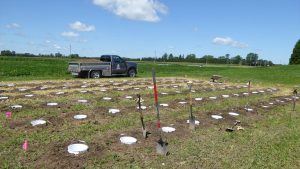Collaborative field crop research
IMPROVING GENETICS

THIS YEAR MARKS an important milestone in Canadian field crop genetics research. Results are being finalized for 12 projects in the Canadian Field Crop Genetics Improvement Cluster — a collaboration between the Canadian Field Crop Research Alliance (CFCRA) and Agriculture and Agri-Food Canada (AAFC) under the Growing Forward 2 (GF2) Cluster program.
Canadian field crop researchers have conducted a variety of projects focused on plant breeding, with an eye to the practical implications for Canadian farmers. The goal of this five-year, $10.3 million research investment is the development and release of improved barley, oat, and soybean varieties, and corn inbreds desired by Canadian farmers and the value chains they serve.
The research was supported in part by the CFCRA, a not-for-profit entity made up of nine partners including provincial farm organizations (Grain Farmers of Ontario is one of them) and industry partners. The CFCRA collaborates on research initiatives that will benefit all members and meet the goal of advancing the genetic capacity of field crops in Canada.
RESEARCH WITH RESULTS
“Canadian farmers are at the root of all research conducted through the CFCRA Cluster,” explains Matthew Czerwinski, CFCRA project manager. “Through the research results of this Cluster, farmers will gain access to leading varieties that will enable them to meet the agronomic and environmental challenges through improved genetics and enhanced crop adaptability.”
With farmers in mind, the results of the 12 projects will deliver high-yielding, disease-resistant varieties, lines with enhanced processing and health quality characteristics, soybean and corn lines adapted to short-season growing regions, and the development of advanced selection tools to improve breeding efficiency and effectiveness. Research projects wrap up in March 2018, and a summary report showcasing the final results of the Cluster will be available at www.fieldcropresearch.ca in April 2018.
With funding under the GF2 program, each project spanned five years. While final results are yet to be released, the projects have already delivered new and improved field crop genetics to Canadian farmers with the release of four new barley varieties, 15 new corn inbreds, eight new oat varieties, and 39 new soybean varieties.
PLANNING AHEAD
Plant breeding is a long process. Many of the research projects in the Cluster build on years of previous research. To maintain continuity, and expand on the successes of the GF2 Cluster, CFCRA took a unique planning approach in 2016 by hosting a two-day Research Summit to determine the future direction of field crop research in Canada.
In November 2016, CFCRA invited researchers, industry, end-users, and government officials from across the value chains that make up the Canadian field crops sector for barley, corn, oats, and soybeans to discuss and evaluate the needs of Canadian field crops and set a direction for future research. The result was a set of research priorities identified for each crop — barley, corn, oats, and soybeans. To read the full list of CFCRA Research Priorities visit www.fieldcropresearch.ca.
“The Research Summit outcomes aligned very closely with the priorities outlined in the upcoming Canadian Agricultural Partnership (CAP) Cluster program for 2018 – 2023,” says Czerwinski. “Environmental sustainability and climate change, and the adaption of crops to new growing areas where they have not previously been grown as a result of climate change were found to be key focus areas. Continuing to develop new inbreds and varieties well-adapted to target environments and disease pressures across Canada, with high yield and quality parameters, continues to be a high priority too.”
The next round of Cluster research under the CAP funding program will kick off in April 2018. CFCRA has submitted an application to Agriculture and Agri-Food Canada for 17 potential research projects under the new Cluster program.
“We’ve seen great results from the latest round of research projects and expect more to come in the next five years,” says Czerwinski. “CFCRA and research conducted through the Field Crop Genetics Improvement Cluster is driven and delivered by individuals who have invested their careers into creating and improving the best field crop varieties and hybrids that put Canadian farmers on the map for production and quality.” •


























